Reflective Essay on Collegial Relationships in Nursing - CR 2 - 2020
VerifiedAdded on 2022/08/27
|10
|2406
|15
Essay
AI Summary
This essay reflects on the importance of collegial relationships in nursing, particularly from the perspective of a new graduate nurse. The author uses the Gibbs Reflective Cycle to analyze a personal experience, highlighting the challenges of transitioning from a student to a professional, and the importance of effective communication with physicians and other healthcare professionals. The essay discusses the need for professional etiquette, confidence, and supportive work environments to foster collegiality. It also explores strategies for improving communication skills, such as active listening and clear articulation, to enhance patient care and promote a positive healthcare team dynamic. The author emphasizes the value of continuous learning and the application of theoretical knowledge to real-world practice. The essay concludes with a strong emphasis on the value of collegiality in nursing practice, highlighting the importance of professional ethics, confidence, and supportive working environments for successful nursing transitions.
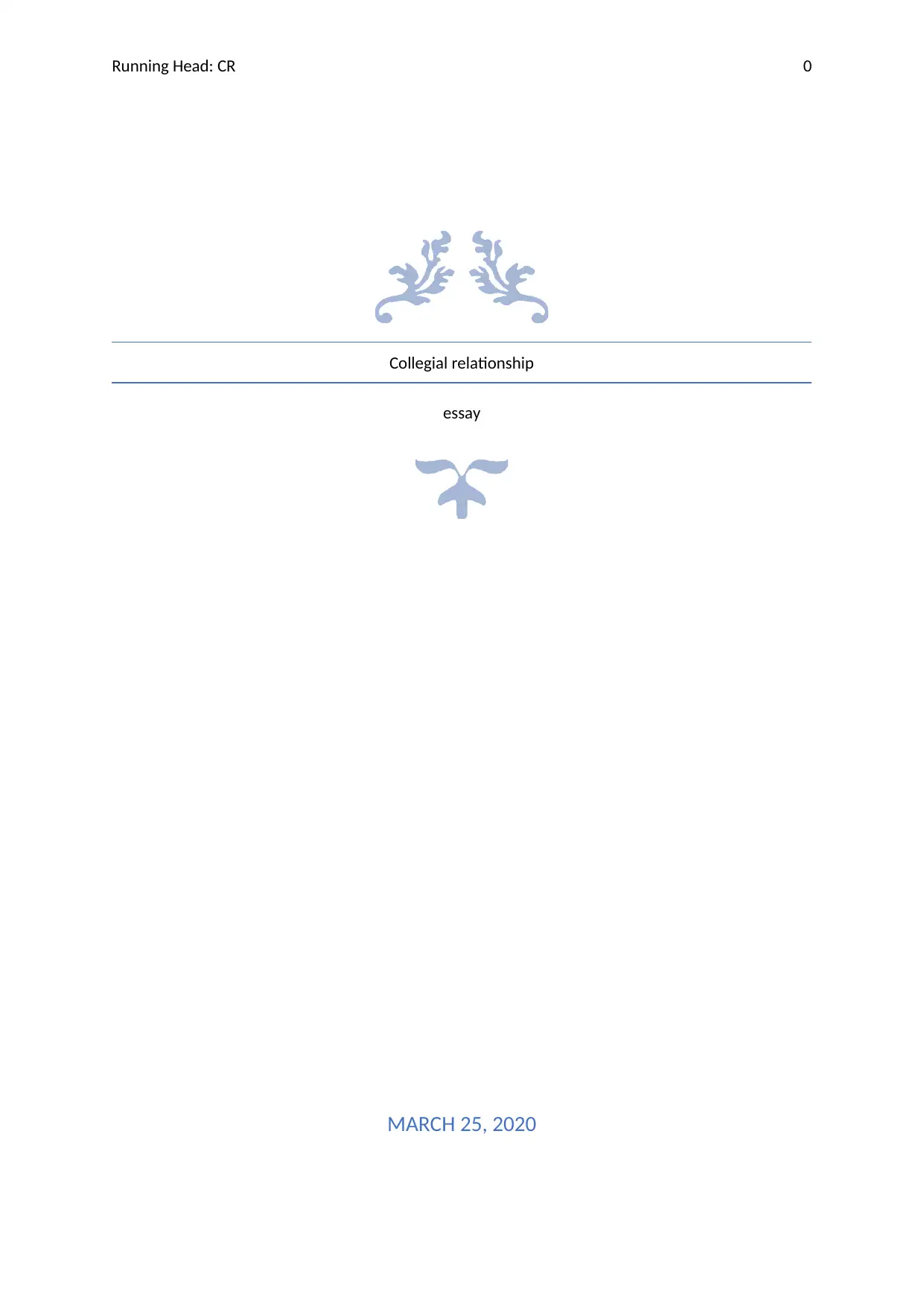
Running Head: CR 0
Collegial relationship
essay
MARCH 25, 2020
Collegial relationship
essay
MARCH 25, 2020
Paraphrase This Document
Need a fresh take? Get an instant paraphrase of this document with our AI Paraphraser
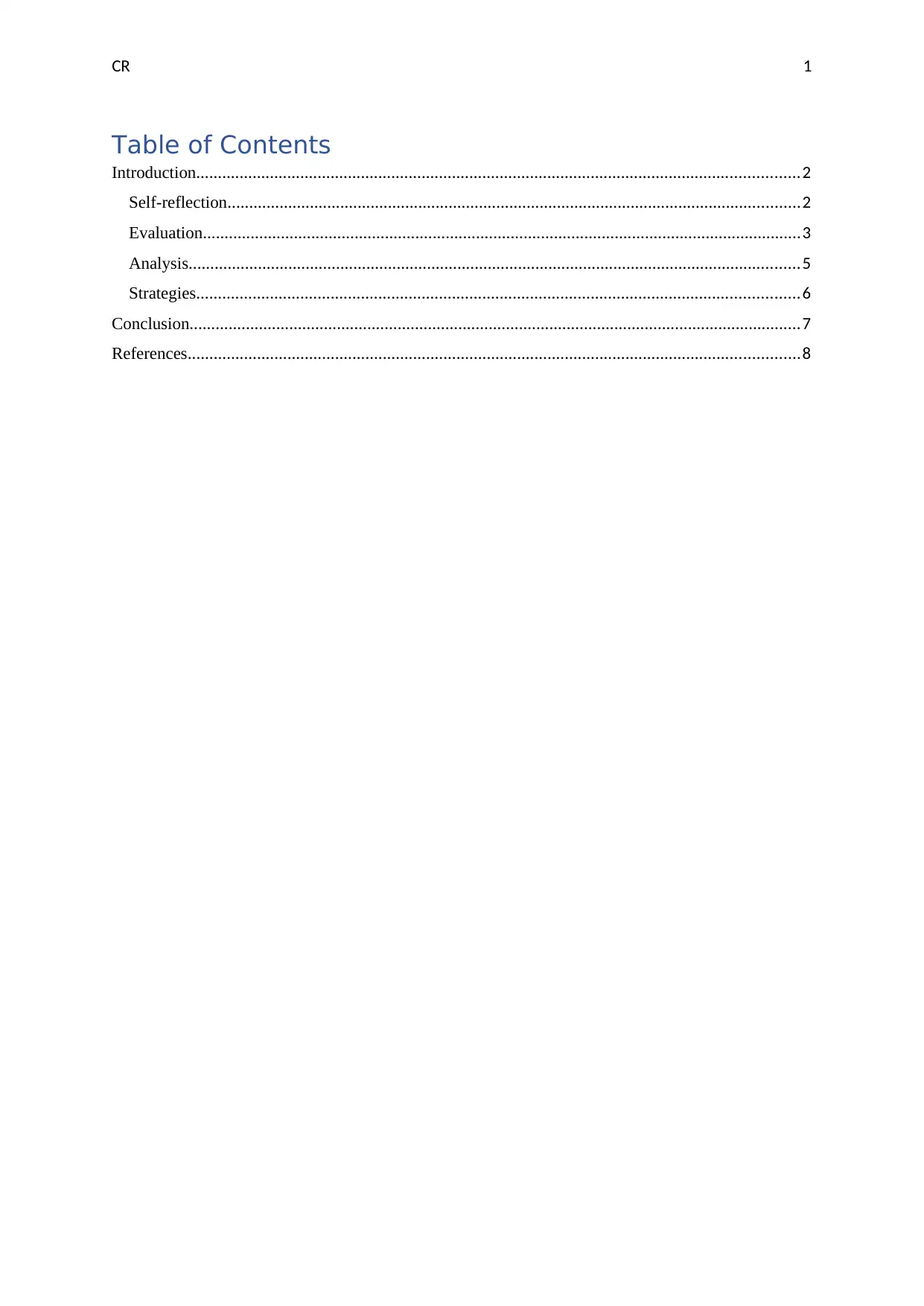
CR 1
Table of Contents
Introduction...........................................................................................................................................2
Self-reflection....................................................................................................................................2
Evaluation..........................................................................................................................................3
Analysis.............................................................................................................................................5
Strategies...........................................................................................................................................6
Conclusion.............................................................................................................................................7
References.............................................................................................................................................8
Table of Contents
Introduction...........................................................................................................................................2
Self-reflection....................................................................................................................................2
Evaluation..........................................................................................................................................3
Analysis.............................................................................................................................................5
Strategies...........................................................................................................................................6
Conclusion.............................................................................................................................................7
References.............................................................................................................................................8
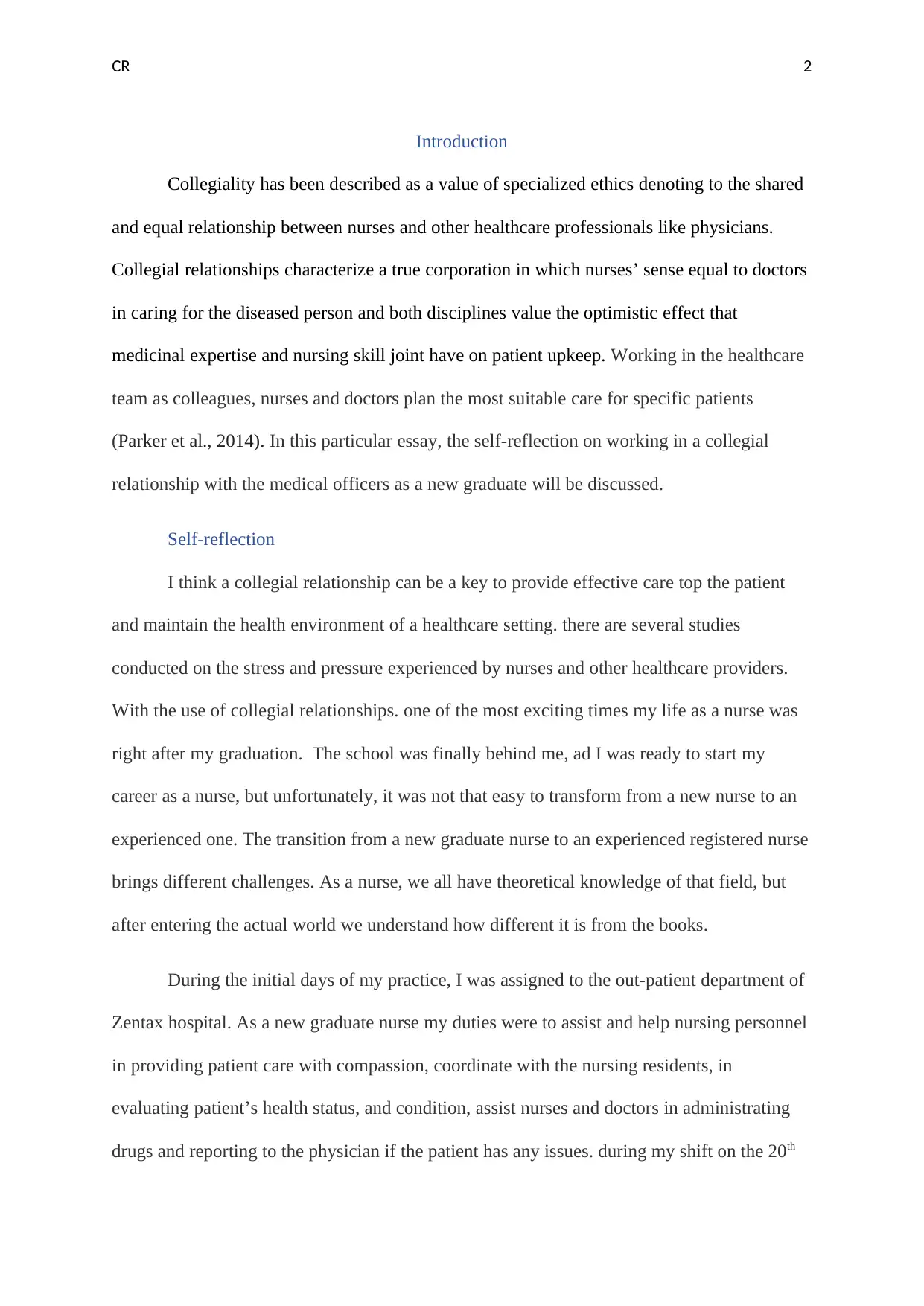
CR 2
Introduction
Collegiality has been described as a value of specialized ethics denoting to the shared
and equal relationship between nurses and other healthcare professionals like physicians.
Collegial relationships characterize a true corporation in which nurses’ sense equal to doctors
in caring for the diseased person and both disciplines value the optimistic effect that
medicinal expertise and nursing skill joint have on patient upkeep. Working in the healthcare
team as colleagues, nurses and doctors plan the most suitable care for specific patients
(Parker et al., 2014). In this particular essay, the self-reflection on working in a collegial
relationship with the medical officers as a new graduate will be discussed.
Self-reflection
I think a collegial relationship can be a key to provide effective care top the patient
and maintain the health environment of a healthcare setting. there are several studies
conducted on the stress and pressure experienced by nurses and other healthcare providers.
With the use of collegial relationships. one of the most exciting times my life as a nurse was
right after my graduation. The school was finally behind me, ad I was ready to start my
career as a nurse, but unfortunately, it was not that easy to transform from a new nurse to an
experienced one. The transition from a new graduate nurse to an experienced registered nurse
brings different challenges. As a nurse, we all have theoretical knowledge of that field, but
after entering the actual world we understand how different it is from the books.
During the initial days of my practice, I was assigned to the out-patient department of
Zentax hospital. As a new graduate nurse my duties were to assist and help nursing personnel
in providing patient care with compassion, coordinate with the nursing residents, in
evaluating patient’s health status, and condition, assist nurses and doctors in administrating
drugs and reporting to the physician if the patient has any issues. during my shift on the 20th
Introduction
Collegiality has been described as a value of specialized ethics denoting to the shared
and equal relationship between nurses and other healthcare professionals like physicians.
Collegial relationships characterize a true corporation in which nurses’ sense equal to doctors
in caring for the diseased person and both disciplines value the optimistic effect that
medicinal expertise and nursing skill joint have on patient upkeep. Working in the healthcare
team as colleagues, nurses and doctors plan the most suitable care for specific patients
(Parker et al., 2014). In this particular essay, the self-reflection on working in a collegial
relationship with the medical officers as a new graduate will be discussed.
Self-reflection
I think a collegial relationship can be a key to provide effective care top the patient
and maintain the health environment of a healthcare setting. there are several studies
conducted on the stress and pressure experienced by nurses and other healthcare providers.
With the use of collegial relationships. one of the most exciting times my life as a nurse was
right after my graduation. The school was finally behind me, ad I was ready to start my
career as a nurse, but unfortunately, it was not that easy to transform from a new nurse to an
experienced one. The transition from a new graduate nurse to an experienced registered nurse
brings different challenges. As a nurse, we all have theoretical knowledge of that field, but
after entering the actual world we understand how different it is from the books.
During the initial days of my practice, I was assigned to the out-patient department of
Zentax hospital. As a new graduate nurse my duties were to assist and help nursing personnel
in providing patient care with compassion, coordinate with the nursing residents, in
evaluating patient’s health status, and condition, assist nurses and doctors in administrating
drugs and reporting to the physician if the patient has any issues. during my shift on the 20th
⊘ This is a preview!⊘
Do you want full access?
Subscribe today to unlock all pages.

Trusted by 1+ million students worldwide
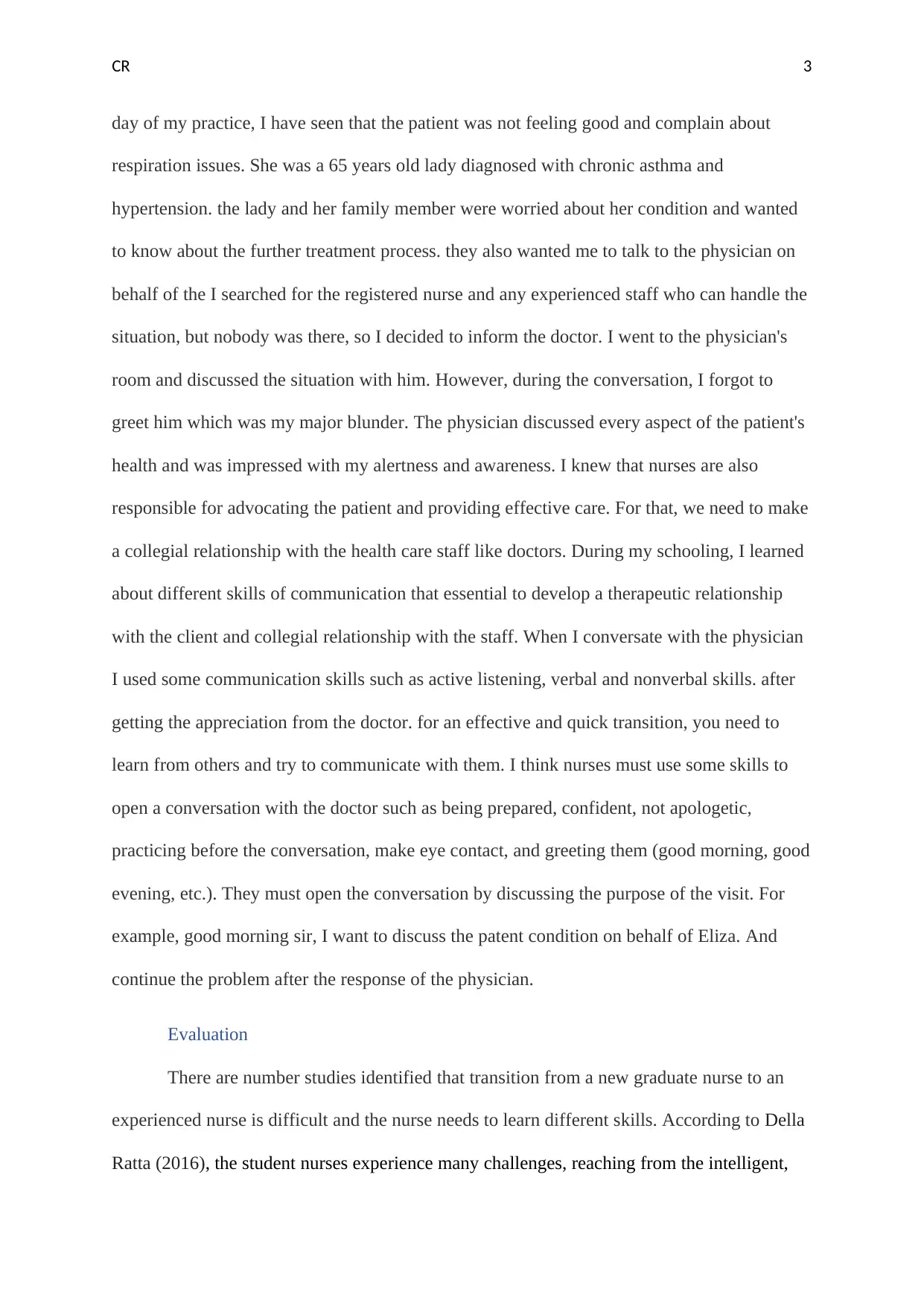
CR 3
day of my practice, I have seen that the patient was not feeling good and complain about
respiration issues. She was a 65 years old lady diagnosed with chronic asthma and
hypertension. the lady and her family member were worried about her condition and wanted
to know about the further treatment process. they also wanted me to talk to the physician on
behalf of the I searched for the registered nurse and any experienced staff who can handle the
situation, but nobody was there, so I decided to inform the doctor. I went to the physician's
room and discussed the situation with him. However, during the conversation, I forgot to
greet him which was my major blunder. The physician discussed every aspect of the patient's
health and was impressed with my alertness and awareness. I knew that nurses are also
responsible for advocating the patient and providing effective care. For that, we need to make
a collegial relationship with the health care staff like doctors. During my schooling, I learned
about different skills of communication that essential to develop a therapeutic relationship
with the client and collegial relationship with the staff. When I conversate with the physician
I used some communication skills such as active listening, verbal and nonverbal skills. after
getting the appreciation from the doctor. for an effective and quick transition, you need to
learn from others and try to communicate with them. I think nurses must use some skills to
open a conversation with the doctor such as being prepared, confident, not apologetic,
practicing before the conversation, make eye contact, and greeting them (good morning, good
evening, etc.). They must open the conversation by discussing the purpose of the visit. For
example, good morning sir, I want to discuss the patent condition on behalf of Eliza. And
continue the problem after the response of the physician.
Evaluation
There are number studies identified that transition from a new graduate nurse to an
experienced nurse is difficult and the nurse needs to learn different skills. According to Della
Ratta (2016), the student nurses experience many challenges, reaching from the intelligent,
day of my practice, I have seen that the patient was not feeling good and complain about
respiration issues. She was a 65 years old lady diagnosed with chronic asthma and
hypertension. the lady and her family member were worried about her condition and wanted
to know about the further treatment process. they also wanted me to talk to the physician on
behalf of the I searched for the registered nurse and any experienced staff who can handle the
situation, but nobody was there, so I decided to inform the doctor. I went to the physician's
room and discussed the situation with him. However, during the conversation, I forgot to
greet him which was my major blunder. The physician discussed every aspect of the patient's
health and was impressed with my alertness and awareness. I knew that nurses are also
responsible for advocating the patient and providing effective care. For that, we need to make
a collegial relationship with the health care staff like doctors. During my schooling, I learned
about different skills of communication that essential to develop a therapeutic relationship
with the client and collegial relationship with the staff. When I conversate with the physician
I used some communication skills such as active listening, verbal and nonverbal skills. after
getting the appreciation from the doctor. for an effective and quick transition, you need to
learn from others and try to communicate with them. I think nurses must use some skills to
open a conversation with the doctor such as being prepared, confident, not apologetic,
practicing before the conversation, make eye contact, and greeting them (good morning, good
evening, etc.). They must open the conversation by discussing the purpose of the visit. For
example, good morning sir, I want to discuss the patent condition on behalf of Eliza. And
continue the problem after the response of the physician.
Evaluation
There are number studies identified that transition from a new graduate nurse to an
experienced nurse is difficult and the nurse needs to learn different skills. According to Della
Ratta (2016), the student nurses experience many challenges, reaching from the intelligent,
Paraphrase This Document
Need a fresh take? Get an instant paraphrase of this document with our AI Paraphraser
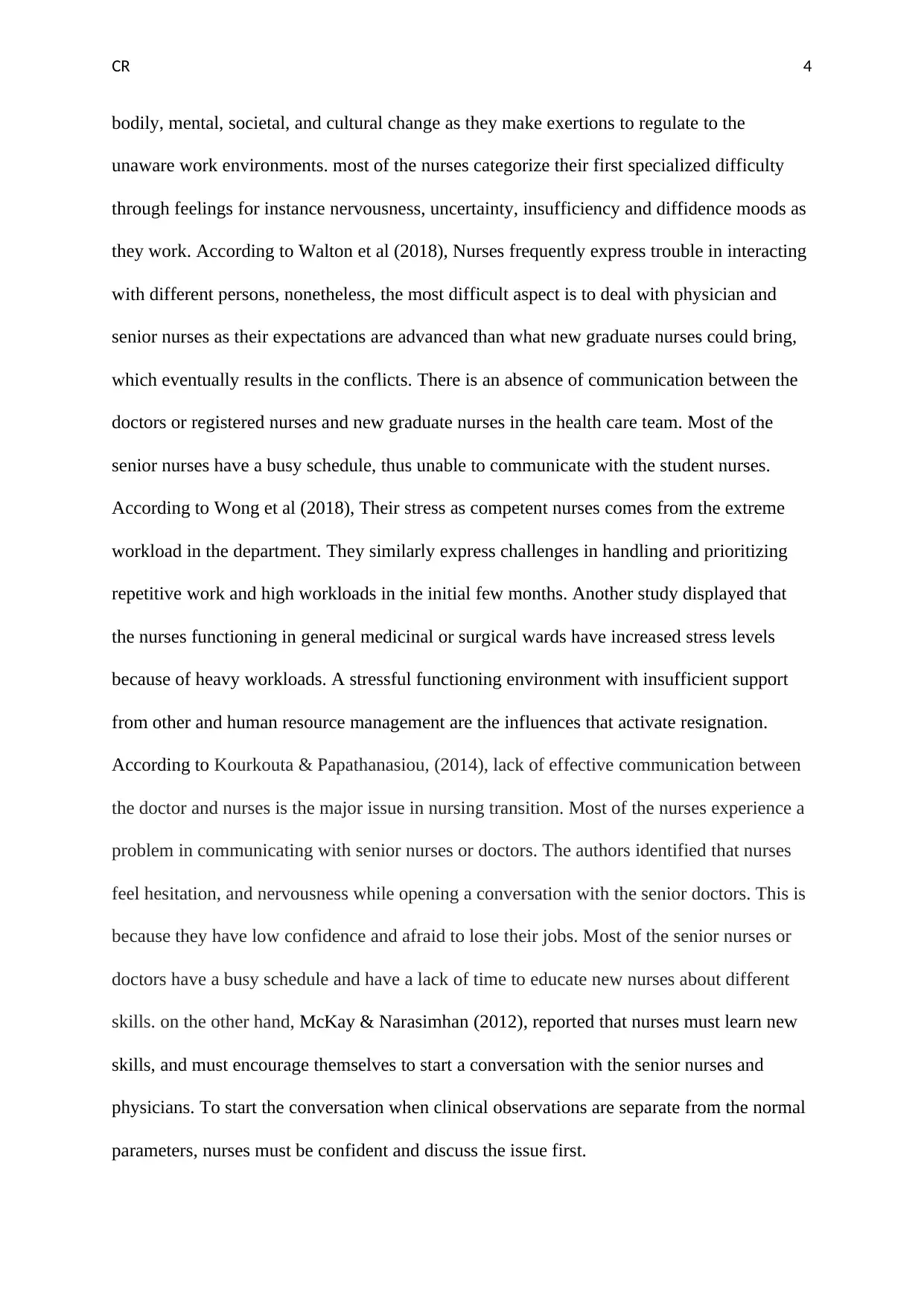
CR 4
bodily, mental, societal, and cultural change as they make exertions to regulate to the
unaware work environments. most of the nurses categorize their first specialized difficulty
through feelings for instance nervousness, uncertainty, insufficiency and diffidence moods as
they work. According to Walton et al (2018), Nurses frequently express trouble in interacting
with different persons, nonetheless, the most difficult aspect is to deal with physician and
senior nurses as their expectations are advanced than what new graduate nurses could bring,
which eventually results in the conflicts. There is an absence of communication between the
doctors or registered nurses and new graduate nurses in the health care team. Most of the
senior nurses have a busy schedule, thus unable to communicate with the student nurses.
According to Wong et al (2018), Their stress as competent nurses comes from the extreme
workload in the department. They similarly express challenges in handling and prioritizing
repetitive work and high workloads in the initial few months. Another study displayed that
the nurses functioning in general medicinal or surgical wards have increased stress levels
because of heavy workloads. A stressful functioning environment with insufficient support
from other and human resource management are the influences that activate resignation.
According to Kourkouta & Papathanasiou, (2014), lack of effective communication between
the doctor and nurses is the major issue in nursing transition. Most of the nurses experience a
problem in communicating with senior nurses or doctors. The authors identified that nurses
feel hesitation, and nervousness while opening a conversation with the senior doctors. This is
because they have low confidence and afraid to lose their jobs. Most of the senior nurses or
doctors have a busy schedule and have a lack of time to educate new nurses about different
skills. on the other hand, McKay & Narasimhan (2012), reported that nurses must learn new
skills, and must encourage themselves to start a conversation with the senior nurses and
physicians. To start the conversation when clinical observations are separate from the normal
parameters, nurses must be confident and discuss the issue first.
bodily, mental, societal, and cultural change as they make exertions to regulate to the
unaware work environments. most of the nurses categorize their first specialized difficulty
through feelings for instance nervousness, uncertainty, insufficiency and diffidence moods as
they work. According to Walton et al (2018), Nurses frequently express trouble in interacting
with different persons, nonetheless, the most difficult aspect is to deal with physician and
senior nurses as their expectations are advanced than what new graduate nurses could bring,
which eventually results in the conflicts. There is an absence of communication between the
doctors or registered nurses and new graduate nurses in the health care team. Most of the
senior nurses have a busy schedule, thus unable to communicate with the student nurses.
According to Wong et al (2018), Their stress as competent nurses comes from the extreme
workload in the department. They similarly express challenges in handling and prioritizing
repetitive work and high workloads in the initial few months. Another study displayed that
the nurses functioning in general medicinal or surgical wards have increased stress levels
because of heavy workloads. A stressful functioning environment with insufficient support
from other and human resource management are the influences that activate resignation.
According to Kourkouta & Papathanasiou, (2014), lack of effective communication between
the doctor and nurses is the major issue in nursing transition. Most of the nurses experience a
problem in communicating with senior nurses or doctors. The authors identified that nurses
feel hesitation, and nervousness while opening a conversation with the senior doctors. This is
because they have low confidence and afraid to lose their jobs. Most of the senior nurses or
doctors have a busy schedule and have a lack of time to educate new nurses about different
skills. on the other hand, McKay & Narasimhan (2012), reported that nurses must learn new
skills, and must encourage themselves to start a conversation with the senior nurses and
physicians. To start the conversation when clinical observations are separate from the normal
parameters, nurses must be confident and discuss the issue first.
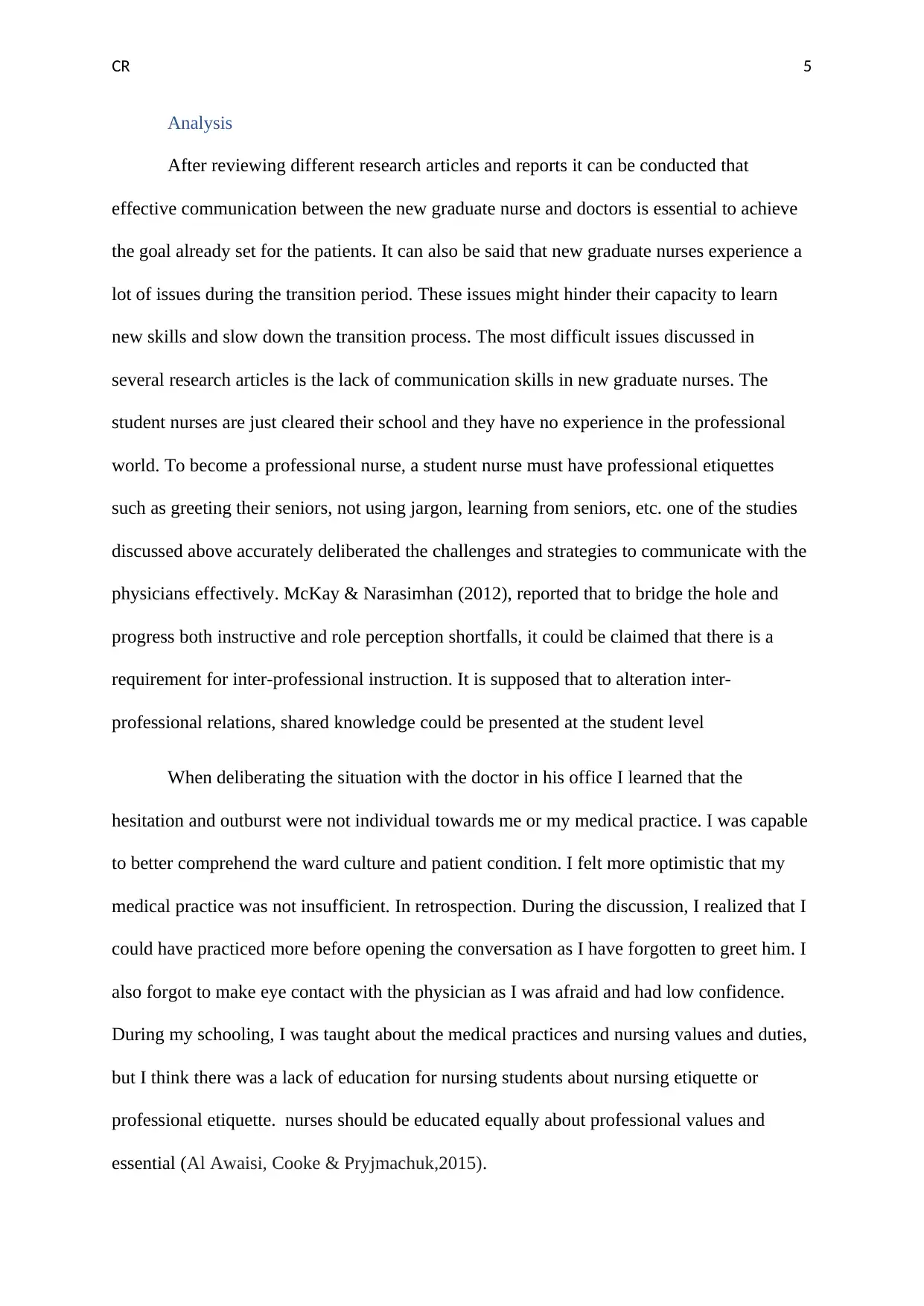
CR 5
Analysis
After reviewing different research articles and reports it can be conducted that
effective communication between the new graduate nurse and doctors is essential to achieve
the goal already set for the patients. It can also be said that new graduate nurses experience a
lot of issues during the transition period. These issues might hinder their capacity to learn
new skills and slow down the transition process. The most difficult issues discussed in
several research articles is the lack of communication skills in new graduate nurses. The
student nurses are just cleared their school and they have no experience in the professional
world. To become a professional nurse, a student nurse must have professional etiquettes
such as greeting their seniors, not using jargon, learning from seniors, etc. one of the studies
discussed above accurately deliberated the challenges and strategies to communicate with the
physicians effectively. McKay & Narasimhan (2012), reported that to bridge the hole and
progress both instructive and role perception shortfalls, it could be claimed that there is a
requirement for inter-professional instruction. It is supposed that to alteration inter-
professional relations, shared knowledge could be presented at the student level
When deliberating the situation with the doctor in his office I learned that the
hesitation and outburst were not individual towards me or my medical practice. I was capable
to better comprehend the ward culture and patient condition. I felt more optimistic that my
medical practice was not insufficient. In retrospection. During the discussion, I realized that I
could have practiced more before opening the conversation as I have forgotten to greet him. I
also forgot to make eye contact with the physician as I was afraid and had low confidence.
During my schooling, I was taught about the medical practices and nursing values and duties,
but I think there was a lack of education for nursing students about nursing etiquette or
professional etiquette. nurses should be educated equally about professional values and
essential (Al Awaisi, Cooke & Pryjmachuk,2015).
Analysis
After reviewing different research articles and reports it can be conducted that
effective communication between the new graduate nurse and doctors is essential to achieve
the goal already set for the patients. It can also be said that new graduate nurses experience a
lot of issues during the transition period. These issues might hinder their capacity to learn
new skills and slow down the transition process. The most difficult issues discussed in
several research articles is the lack of communication skills in new graduate nurses. The
student nurses are just cleared their school and they have no experience in the professional
world. To become a professional nurse, a student nurse must have professional etiquettes
such as greeting their seniors, not using jargon, learning from seniors, etc. one of the studies
discussed above accurately deliberated the challenges and strategies to communicate with the
physicians effectively. McKay & Narasimhan (2012), reported that to bridge the hole and
progress both instructive and role perception shortfalls, it could be claimed that there is a
requirement for inter-professional instruction. It is supposed that to alteration inter-
professional relations, shared knowledge could be presented at the student level
When deliberating the situation with the doctor in his office I learned that the
hesitation and outburst were not individual towards me or my medical practice. I was capable
to better comprehend the ward culture and patient condition. I felt more optimistic that my
medical practice was not insufficient. In retrospection. During the discussion, I realized that I
could have practiced more before opening the conversation as I have forgotten to greet him. I
also forgot to make eye contact with the physician as I was afraid and had low confidence.
During my schooling, I was taught about the medical practices and nursing values and duties,
but I think there was a lack of education for nursing students about nursing etiquette or
professional etiquette. nurses should be educated equally about professional values and
essential (Al Awaisi, Cooke & Pryjmachuk,2015).
⊘ This is a preview!⊘
Do you want full access?
Subscribe today to unlock all pages.

Trusted by 1+ million students worldwide
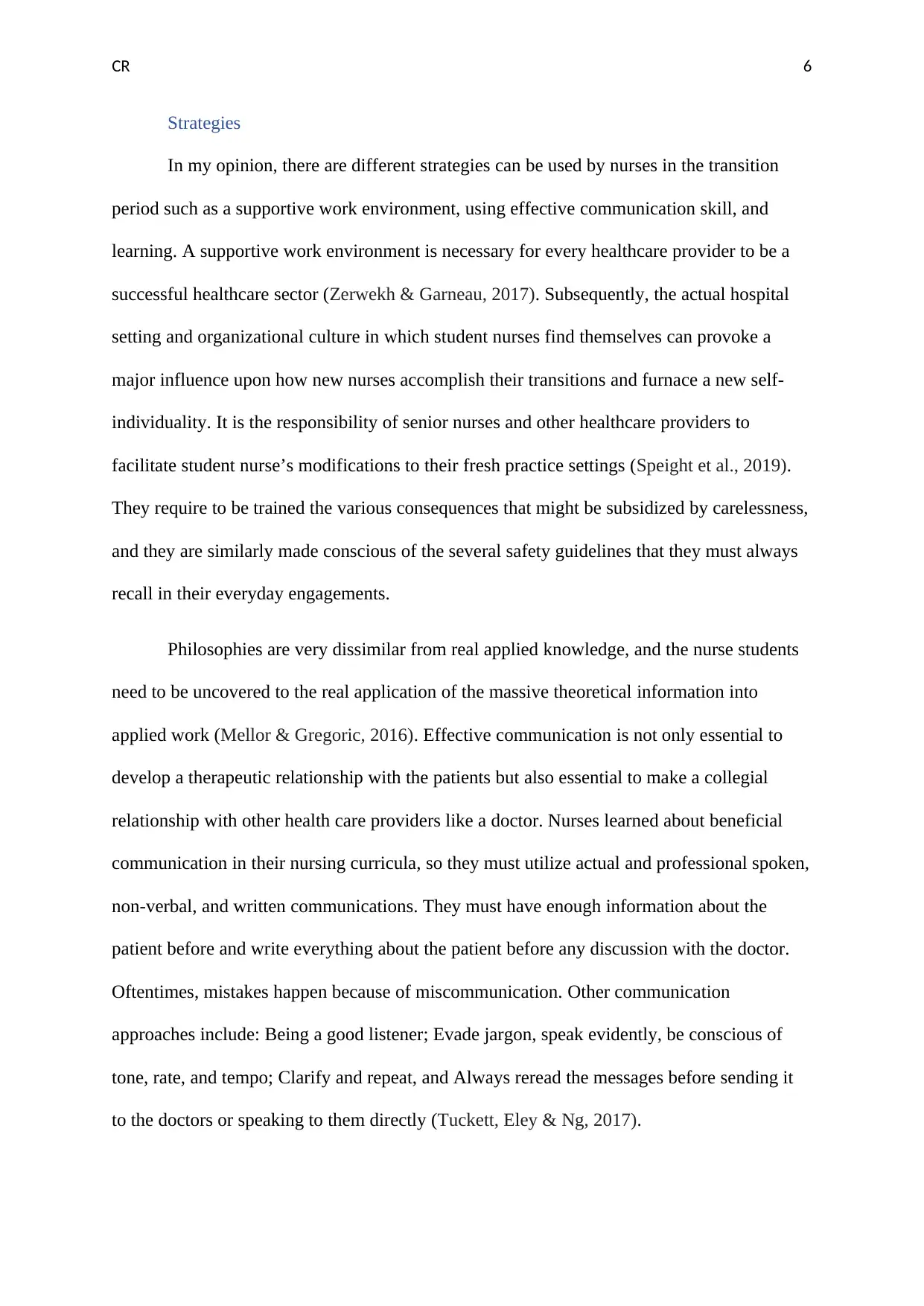
CR 6
Strategies
In my opinion, there are different strategies can be used by nurses in the transition
period such as a supportive work environment, using effective communication skill, and
learning. A supportive work environment is necessary for every healthcare provider to be a
successful healthcare sector (Zerwekh & Garneau, 2017). Subsequently, the actual hospital
setting and organizational culture in which student nurses find themselves can provoke a
major influence upon how new nurses accomplish their transitions and furnace a new self-
individuality. It is the responsibility of senior nurses and other healthcare providers to
facilitate student nurse’s modifications to their fresh practice settings (Speight et al., 2019).
They require to be trained the various consequences that might be subsidized by carelessness,
and they are similarly made conscious of the several safety guidelines that they must always
recall in their everyday engagements.
Philosophies are very dissimilar from real applied knowledge, and the nurse students
need to be uncovered to the real application of the massive theoretical information into
applied work (Mellor & Gregoric, 2016). Effective communication is not only essential to
develop a therapeutic relationship with the patients but also essential to make a collegial
relationship with other health care providers like a doctor. Nurses learned about beneficial
communication in their nursing curricula, so they must utilize actual and professional spoken,
non-verbal, and written communications. They must have enough information about the
patient before and write everything about the patient before any discussion with the doctor.
Oftentimes, mistakes happen because of miscommunication. Other communication
approaches include: Being a good listener; Evade jargon, speak evidently, be conscious of
tone, rate, and tempo; Clarify and repeat, and Always reread the messages before sending it
to the doctors or speaking to them directly (Tuckett, Eley & Ng, 2017).
Strategies
In my opinion, there are different strategies can be used by nurses in the transition
period such as a supportive work environment, using effective communication skill, and
learning. A supportive work environment is necessary for every healthcare provider to be a
successful healthcare sector (Zerwekh & Garneau, 2017). Subsequently, the actual hospital
setting and organizational culture in which student nurses find themselves can provoke a
major influence upon how new nurses accomplish their transitions and furnace a new self-
individuality. It is the responsibility of senior nurses and other healthcare providers to
facilitate student nurse’s modifications to their fresh practice settings (Speight et al., 2019).
They require to be trained the various consequences that might be subsidized by carelessness,
and they are similarly made conscious of the several safety guidelines that they must always
recall in their everyday engagements.
Philosophies are very dissimilar from real applied knowledge, and the nurse students
need to be uncovered to the real application of the massive theoretical information into
applied work (Mellor & Gregoric, 2016). Effective communication is not only essential to
develop a therapeutic relationship with the patients but also essential to make a collegial
relationship with other health care providers like a doctor. Nurses learned about beneficial
communication in their nursing curricula, so they must utilize actual and professional spoken,
non-verbal, and written communications. They must have enough information about the
patient before and write everything about the patient before any discussion with the doctor.
Oftentimes, mistakes happen because of miscommunication. Other communication
approaches include: Being a good listener; Evade jargon, speak evidently, be conscious of
tone, rate, and tempo; Clarify and repeat, and Always reread the messages before sending it
to the doctors or speaking to them directly (Tuckett, Eley & Ng, 2017).
Paraphrase This Document
Need a fresh take? Get an instant paraphrase of this document with our AI Paraphraser
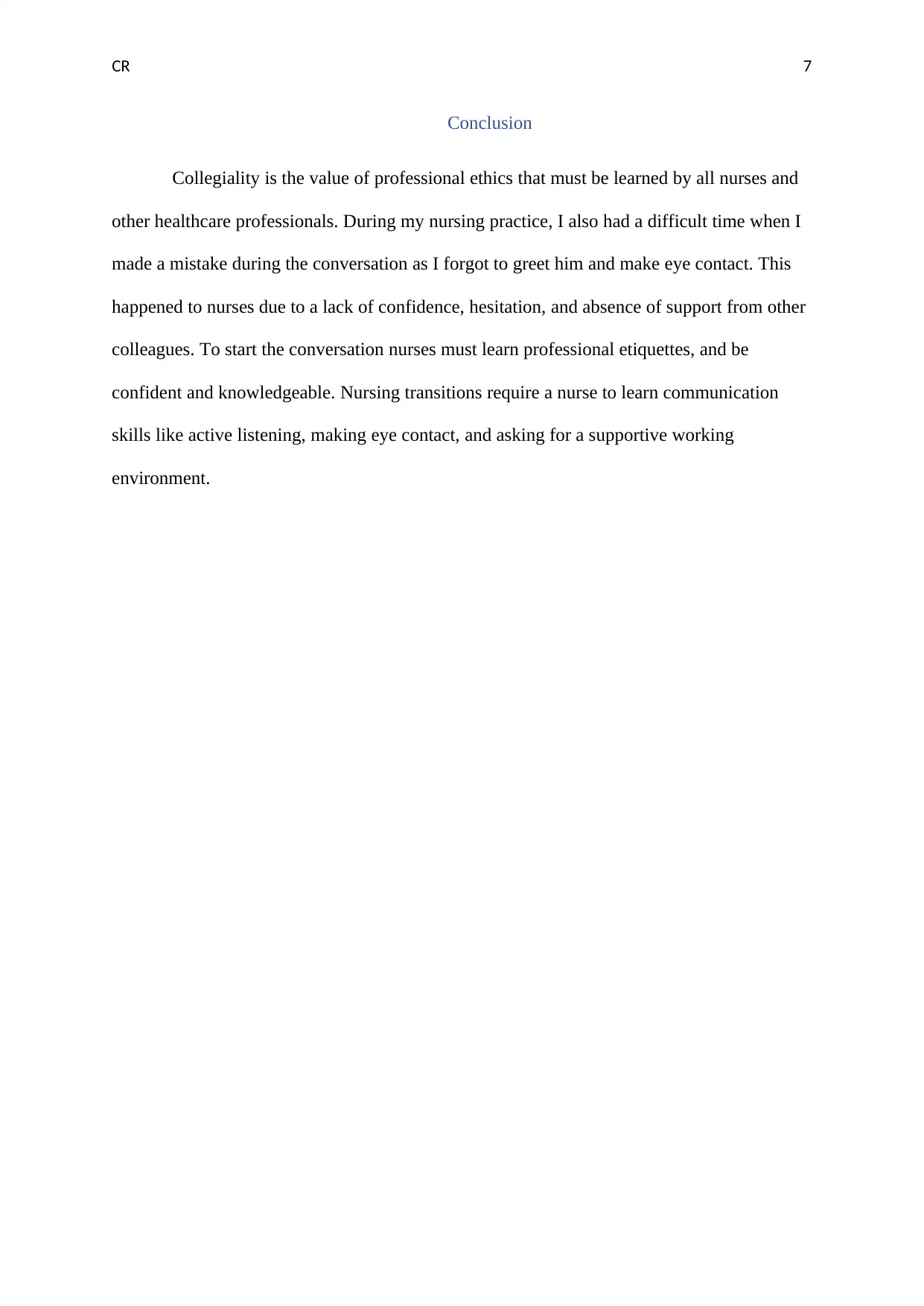
CR 7
Conclusion
Collegiality is the value of professional ethics that must be learned by all nurses and
other healthcare professionals. During my nursing practice, I also had a difficult time when I
made a mistake during the conversation as I forgot to greet him and make eye contact. This
happened to nurses due to a lack of confidence, hesitation, and absence of support from other
colleagues. To start the conversation nurses must learn professional etiquettes, and be
confident and knowledgeable. Nursing transitions require a nurse to learn communication
skills like active listening, making eye contact, and asking for a supportive working
environment.
Conclusion
Collegiality is the value of professional ethics that must be learned by all nurses and
other healthcare professionals. During my nursing practice, I also had a difficult time when I
made a mistake during the conversation as I forgot to greet him and make eye contact. This
happened to nurses due to a lack of confidence, hesitation, and absence of support from other
colleagues. To start the conversation nurses must learn professional etiquettes, and be
confident and knowledgeable. Nursing transitions require a nurse to learn communication
skills like active listening, making eye contact, and asking for a supportive working
environment.
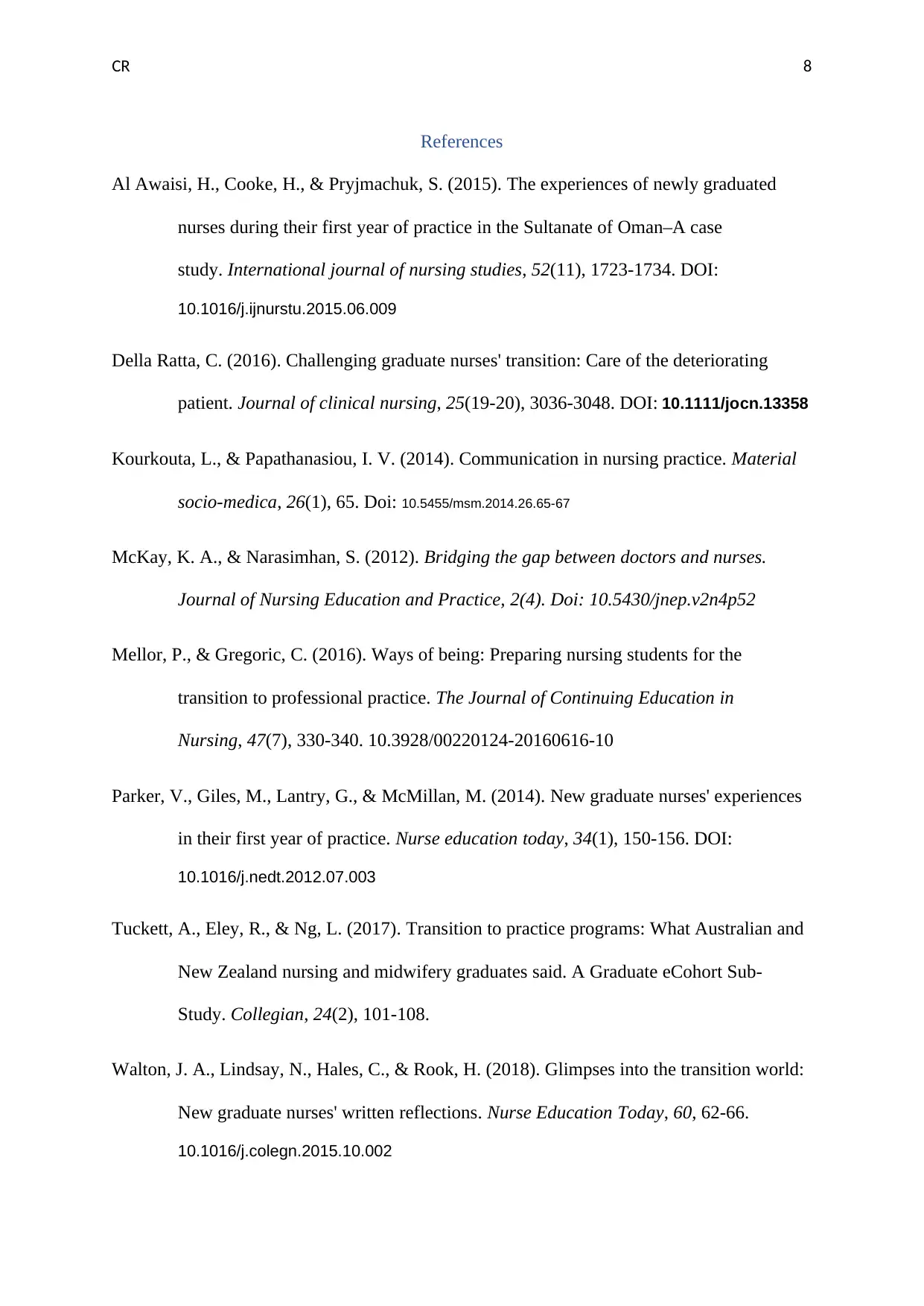
CR 8
References
Al Awaisi, H., Cooke, H., & Pryjmachuk, S. (2015). The experiences of newly graduated
nurses during their first year of practice in the Sultanate of Oman–A case
study. International journal of nursing studies, 52(11), 1723-1734. DOI:
10.1016/j.ijnurstu.2015.06.009
Della Ratta, C. (2016). Challenging graduate nurses' transition: Care of the deteriorating
patient. Journal of clinical nursing, 25(19-20), 3036-3048. DOI: 10.1111/jocn.13358
Kourkouta, L., & Papathanasiou, I. V. (2014). Communication in nursing practice. Material
socio-medica, 26(1), 65. Doi: 10.5455/msm.2014.26.65-67
McKay, K. A., & Narasimhan, S. (2012). Bridging the gap between doctors and nurses.
Journal of Nursing Education and Practice, 2(4). Doi: 10.5430/jnep.v2n4p52
Mellor, P., & Gregoric, C. (2016). Ways of being: Preparing nursing students for the
transition to professional practice. The Journal of Continuing Education in
Nursing, 47(7), 330-340. 10.3928/00220124-20160616-10
Parker, V., Giles, M., Lantry, G., & McMillan, M. (2014). New graduate nurses' experiences
in their first year of practice. Nurse education today, 34(1), 150-156. DOI:
10.1016/j.nedt.2012.07.003
Tuckett, A., Eley, R., & Ng, L. (2017). Transition to practice programs: What Australian and
New Zealand nursing and midwifery graduates said. A Graduate eCohort Sub-
Study. Collegian, 24(2), 101-108.
Walton, J. A., Lindsay, N., Hales, C., & Rook, H. (2018). Glimpses into the transition world:
New graduate nurses' written reflections. Nurse Education Today, 60, 62-66.
10.1016/j.colegn.2015.10.002
References
Al Awaisi, H., Cooke, H., & Pryjmachuk, S. (2015). The experiences of newly graduated
nurses during their first year of practice in the Sultanate of Oman–A case
study. International journal of nursing studies, 52(11), 1723-1734. DOI:
10.1016/j.ijnurstu.2015.06.009
Della Ratta, C. (2016). Challenging graduate nurses' transition: Care of the deteriorating
patient. Journal of clinical nursing, 25(19-20), 3036-3048. DOI: 10.1111/jocn.13358
Kourkouta, L., & Papathanasiou, I. V. (2014). Communication in nursing practice. Material
socio-medica, 26(1), 65. Doi: 10.5455/msm.2014.26.65-67
McKay, K. A., & Narasimhan, S. (2012). Bridging the gap between doctors and nurses.
Journal of Nursing Education and Practice, 2(4). Doi: 10.5430/jnep.v2n4p52
Mellor, P., & Gregoric, C. (2016). Ways of being: Preparing nursing students for the
transition to professional practice. The Journal of Continuing Education in
Nursing, 47(7), 330-340. 10.3928/00220124-20160616-10
Parker, V., Giles, M., Lantry, G., & McMillan, M. (2014). New graduate nurses' experiences
in their first year of practice. Nurse education today, 34(1), 150-156. DOI:
10.1016/j.nedt.2012.07.003
Tuckett, A., Eley, R., & Ng, L. (2017). Transition to practice programs: What Australian and
New Zealand nursing and midwifery graduates said. A Graduate eCohort Sub-
Study. Collegian, 24(2), 101-108.
Walton, J. A., Lindsay, N., Hales, C., & Rook, H. (2018). Glimpses into the transition world:
New graduate nurses' written reflections. Nurse Education Today, 60, 62-66.
10.1016/j.colegn.2015.10.002
⊘ This is a preview!⊘
Do you want full access?
Subscribe today to unlock all pages.

Trusted by 1+ million students worldwide
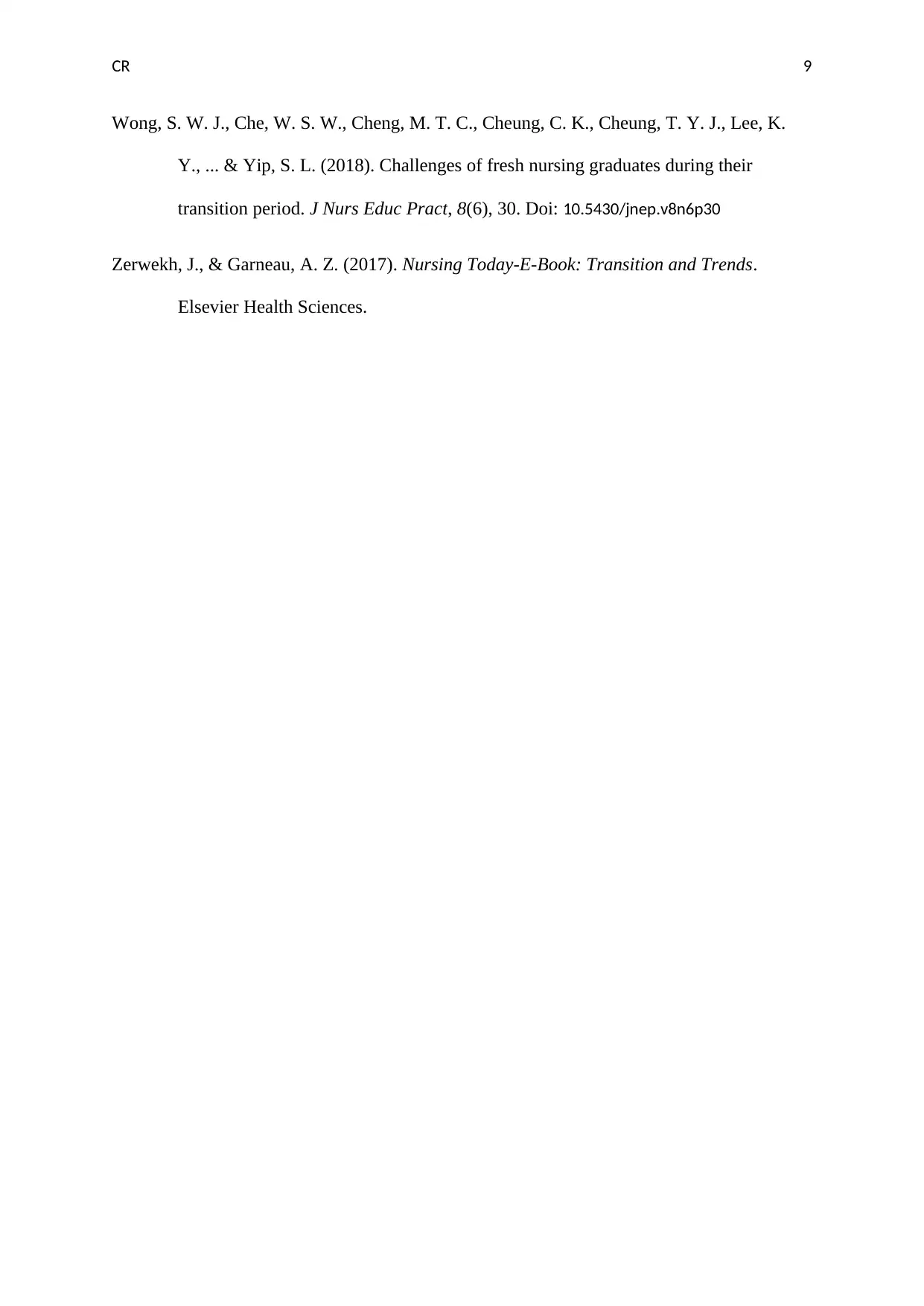
CR 9
Wong, S. W. J., Che, W. S. W., Cheng, M. T. C., Cheung, C. K., Cheung, T. Y. J., Lee, K.
Y., ... & Yip, S. L. (2018). Challenges of fresh nursing graduates during their
transition period. J Nurs Educ Pract, 8(6), 30. Doi: 10.5430/jnep.v8n6p30
Zerwekh, J., & Garneau, A. Z. (2017). Nursing Today-E-Book: Transition and Trends.
Elsevier Health Sciences.
Wong, S. W. J., Che, W. S. W., Cheng, M. T. C., Cheung, C. K., Cheung, T. Y. J., Lee, K.
Y., ... & Yip, S. L. (2018). Challenges of fresh nursing graduates during their
transition period. J Nurs Educ Pract, 8(6), 30. Doi: 10.5430/jnep.v8n6p30
Zerwekh, J., & Garneau, A. Z. (2017). Nursing Today-E-Book: Transition and Trends.
Elsevier Health Sciences.
1 out of 10
Related Documents
Your All-in-One AI-Powered Toolkit for Academic Success.
+13062052269
info@desklib.com
Available 24*7 on WhatsApp / Email
![[object Object]](/_next/static/media/star-bottom.7253800d.svg)
Unlock your academic potential
Copyright © 2020–2026 A2Z Services. All Rights Reserved. Developed and managed by ZUCOL.





